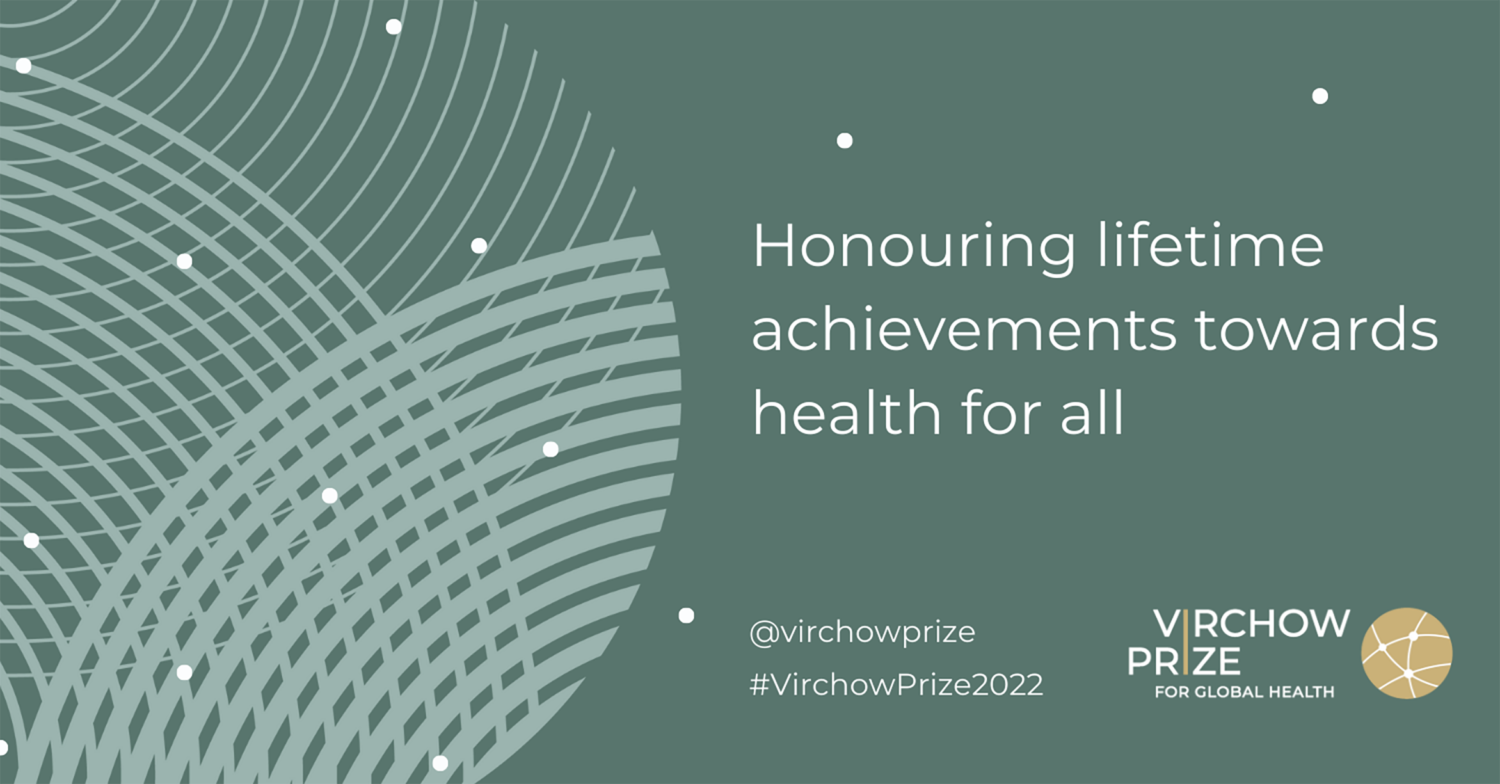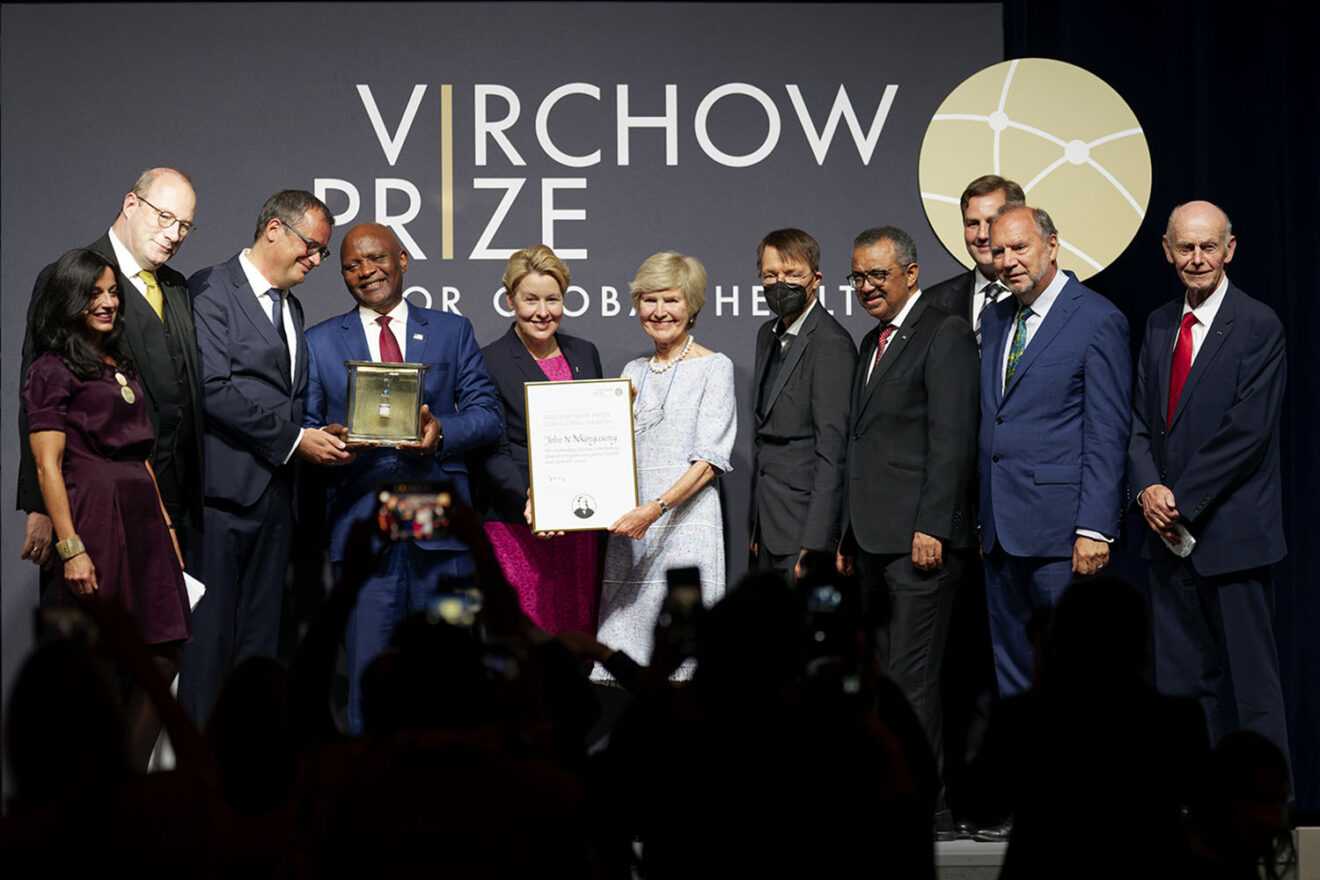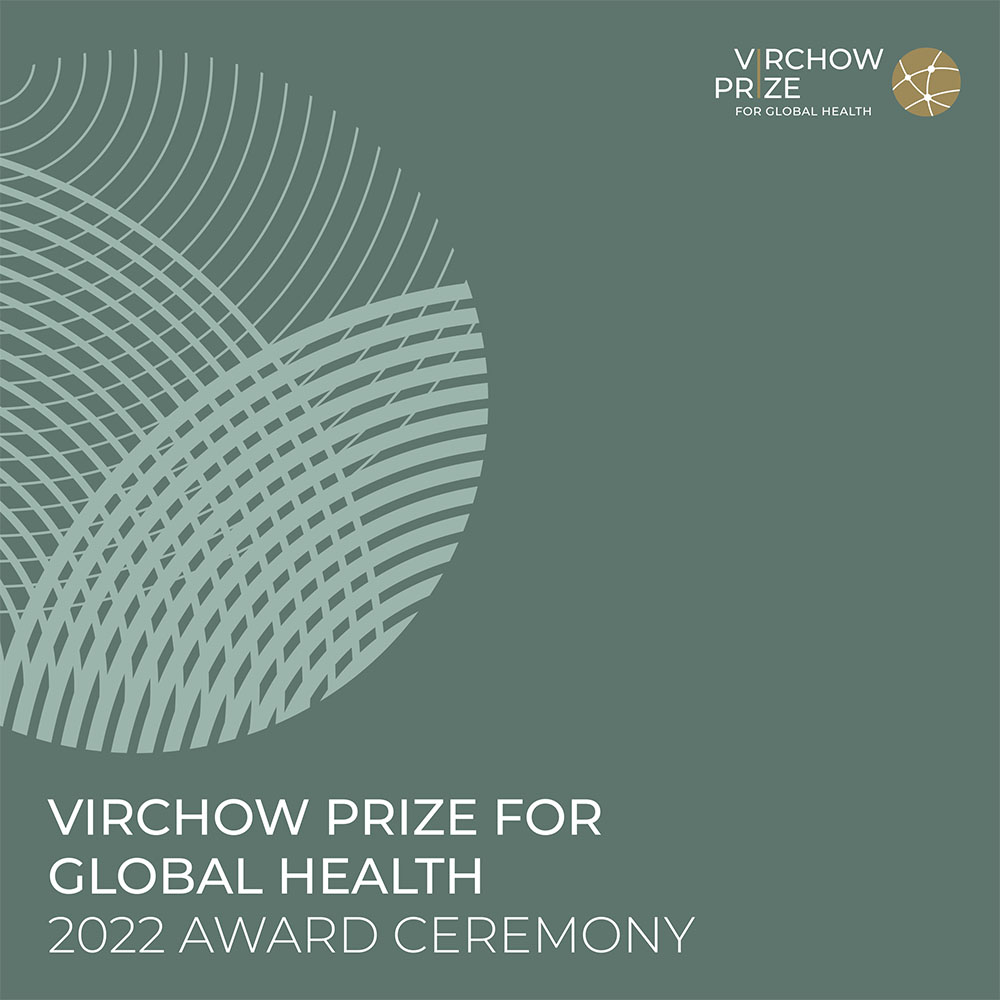The Virchow Prize
Towards Health for All
2022 INAUGURAL VIRCHOW PRIZE AWARD CEREMONY
FRANK-WALTER STEINMEIER
PRESIDENT OF THE FEDERAL REPUBLIC OF GERMANY
MOMENTS

HIGHLIGHT VIDEO
I am truly overwhelmed with gratitude and appreciation for this humbling recognition.
I would like to start by recognizing some of the dignitaries who are here this evening:
Mayor Giffey,
Ambassador Stéphanie Seydoux,
Director-General Dr. Tedros Adhanom Ghebreyesus,
Professor Dr. Peter Piot,
Professor Dr. Axel Pries,
The Virchow Foundation for Global Health and the founders of the foundation – thank you for bringing visibility to the great work of Rudolf Virchow and his many contributions to global health,
Excellencies, Ladies, Gentlemen and friends,
Dr Chief Fuasegong, friend from childhood,
Good evening!
I am humbled and honored to accept the Virchow Prize for Global Health on behalf of the global health community.
Even more humbling is the overwhelming feeling of being the inaugural laurate of this prestigious prize.
I would like to extend a special thank you to the Virchow Prize Committee for this honor.
Ladies and gentlemen, friends, colleagues –
I accept this Prize for Global Health at a moment when 620 million people across the world have been infected with the SARS-COV-2 virus and over 6.5 million have died of the COVID-19 disease caused by the virus.
I accept this Prize at a moment when over 85 million people have been infected with the HIV virus in the last 40 years, and about 40 million lives lost due to this terrible disease and over 38 million still living with the disease.
I accept this Prize today knowing that the global health community is battling multiple public health challenges including repeated Ebola outbreaks, monkey poxs, cholera, tidal wave of rising non-communicable diseases and mental health.
In the 21st century, Global Health will continue to be challenged by population growth, climate change, urbanization, increasing pressures on water supply and others.
I also accept this Prize recognizing the tremendous disparity, tremendous inequities, and tremendous gaps in health systems that characterize the global health practice landscape.
The word “global” in global health can be subjective or objective, depending on the context and setting. Some still see global health as doing something for others.
In 2009, Peter Piot and Geof Garnet wrote a piece in the Lancet – entitled – “Health is Global”
In three words, they described it all. What affects one affects all of us. The current COVID-19 pandemic made global health truly global.
Like public health and medicine, global health should have three basic functions: 1) ability to generate new knowledge and theories about global health issues, 2) determine structural influential factors, and 3) develop global solutions with appropriate frameworks, strategies, policies, laws, regulations, political leadership, and diplomacy.
I always remember Kofi Annan as a great global health leader.
When he became Secretary-General at the UN just before the turn of the century, ignorance and denial of the HIV / AIDS epidemic were at its height, and new infections were rising dramatically. The poor could not afford the drugs that meant a lifeline.
Kofi Annan was instrumental in breaking the taboos around AIDS. Using diplomatic prowess and his charisma to convince leaders to act- and if that did not help, then Kofi Annan spoke up: “Friends, we know what it takes to turn the tide against this epidemic. It requires every president and prime minister, every parliamentarian and politician, to decide and declare that ‘AIDS stops with me. AIDS stops with me.’”
Kofi Annan demanded that deeds followed lofty proclamations. When Governments invested less than one billion dollars for the prevention and treatment of HIV / AIDS, he demanded ten. Annan lobbied relentlessly until the Global Fund to Fight AIDS, Tuberculosis and Malaria was founded.”
Rudolf Virchow would have been proud of Kofi Annan and addressing today’s challenges in global health would require the philosophical and visionary thinking of Rudolf Virchow who was a physician, biologist, anthropologist, politician, and writer, who said that “medicine is a social science, and politics is nothing but medicine on a grand scale.”
In brief, good global health is good politics!
Receiving the Virchow Prize for Global Health symbolizes the spirit of global health and partnerships that continue to inspire and enable the progress in global health.
Today I come to Berlin as a trustee, inspired and with renewed dedication to global health. I accept this prize on behalf of all women and men who are engaged in the fight to break down the barriers in global health inequities. As a trustee, from the depth of my consciences, I am aware that this prize is much more than an honor to me personally. Rather it recognizes the many supporters and enablers who have accompanied me in my three decades of global health.
To paraphrase Dr Martin Luther King – Every time I take a flight, I am always mindful of the many people who make a successful journey possible – the known pilots and the unknown ground crew.
In this spirit, I had the benefit of training during my undergraduate years at the University of Yaoundé in Cameroon. It was an exciting time for me. I was working in the laboratory of my late Professor Peter Martin Ndumbe when I met Professor Peter Piot in the 80s. Two important mentors in my life who shared the same name and who happen to be the inspiration for the name of our first-born son.
Shortly after that chance encounter, Peter made it possible for me to travel from Cameroon to Belgium for graduate school. Peter is actually the catalyst for my career in public health – having created an opportunity for me to study at the Institute of Tropical Medicine in Antwerp, Belgium, where I was the first African to lead a renowned virology laboratory at the age of 34.He took a risk at that time – so let’s give young people a chance to lead.
The United States Centers for Disease Control and Prevention served as another instrumental training ground for me. CDC taught me true public health. It’s where I was able to build on the strong foundation of my education at University of Yaoundé and the Institute of Tropical Medicine and truly become a public health expert.
At CDC, I benefitted from working with Dr. Alan Greenberg in Côte d’Ivoire to stand up a virology lab. Alan is an epidemiologist who understood the importance of lab.
Another influential person in my career at CDC was Dr. Debi Birx. Establishing ASLM is one of my proudest moments at CDC and served as a testament to the power of partnerships.
Tedros, you were there when we launched ASLM in Addis in 2013. As Ethiopia’s Minister of Health, you were critical to ASLM’s launch and securing buy-in and support from across the continent.
Africa Centres for Disease Control and Prevention has been another pivotal part of my career journey that was heavily dependent on partnerships and key champions of public health like South Africa President Honorable Cyril Ramaphosa, African Union Chairperson Moussa Faki Mahamat, and talented staff of Africa CDC. Africa CDC is where I saw firsthand how public health and good politics come together to enable the young Agency to play a vital role in the fight against the COVID-19 pandemic.
In my current role as the U.S. Global AIDS Coordinator and Special Representative for Global Health, I not only stand on the shoulders of the accomplished PEPFAR coordinators and their achievements, the PEPFAR personnel across the globe, our partner countries, civil society, and public-private partners for the support they’ve extended to me as we work together to bring HIV/AIDS to an end by 2030. And even more excited by Secretary Anthony Blinken’s vision to prioritize global health and health security as one of his major priorities.
Let me take a moment to say a special thank you to my family: my lovely wife Susan is here and has been the pillar behind my journey in global health. Our children Pete, Gladys, Paul – thank you all for accommodating me and supporting me.
Colleagues and friends, we should all refuse to accept despair as a response to the multiple challenges facing the global health landscape.
We should refuse to accept the view that scarcity should tragically define inequitable and timely access to global health commodities.
We should refuse to despair on multilateralism and regionalism and continue to strengthen these institutions and reform them as needed (both global and regional) as an expression of instruments of global solidarity and cooperation.
Only through cooperation, collaboration, coordination, and communication shall we have courage to face the uncertainties of the future of global health challenges.
As I move to the end of my remarks, I have reflected on my three-decade journey in global health and reach the conclusion that good global health practice will require that we master the concepts of what I call 5 Ps: Know your Pathology/Pathogen, Population, Policy, Politics, and Partnerships.
In conclusion, I strongly believe we should invest in global health leadership skills. So, I strongly believe Rudolf Virchow would know what I mean when I say that I accept this award in the spirit of a curator of some precious heirloom, which I hold in trust for its true owner – the next generation of global health leaders.
I thank you!


